Posted by Olivia W on Thursday, Mar 2, 2023
Iowa City was relatively late in founding a free public library – by the time the library was founded, 31 other cities in Iowa had tax funded public libraries. The idea of the free public library was first brought up in September of 1896, and the Iowa City Free Public Library opened its doors to the public in January of 1897. Although the Library was started with private donations, it was always intended to be for the public and supported by taxpayers. This came to pass two months after opening, in March of 1897, when the Iowa City Public Library tax proposition passed with a vote of 1283 to 299.
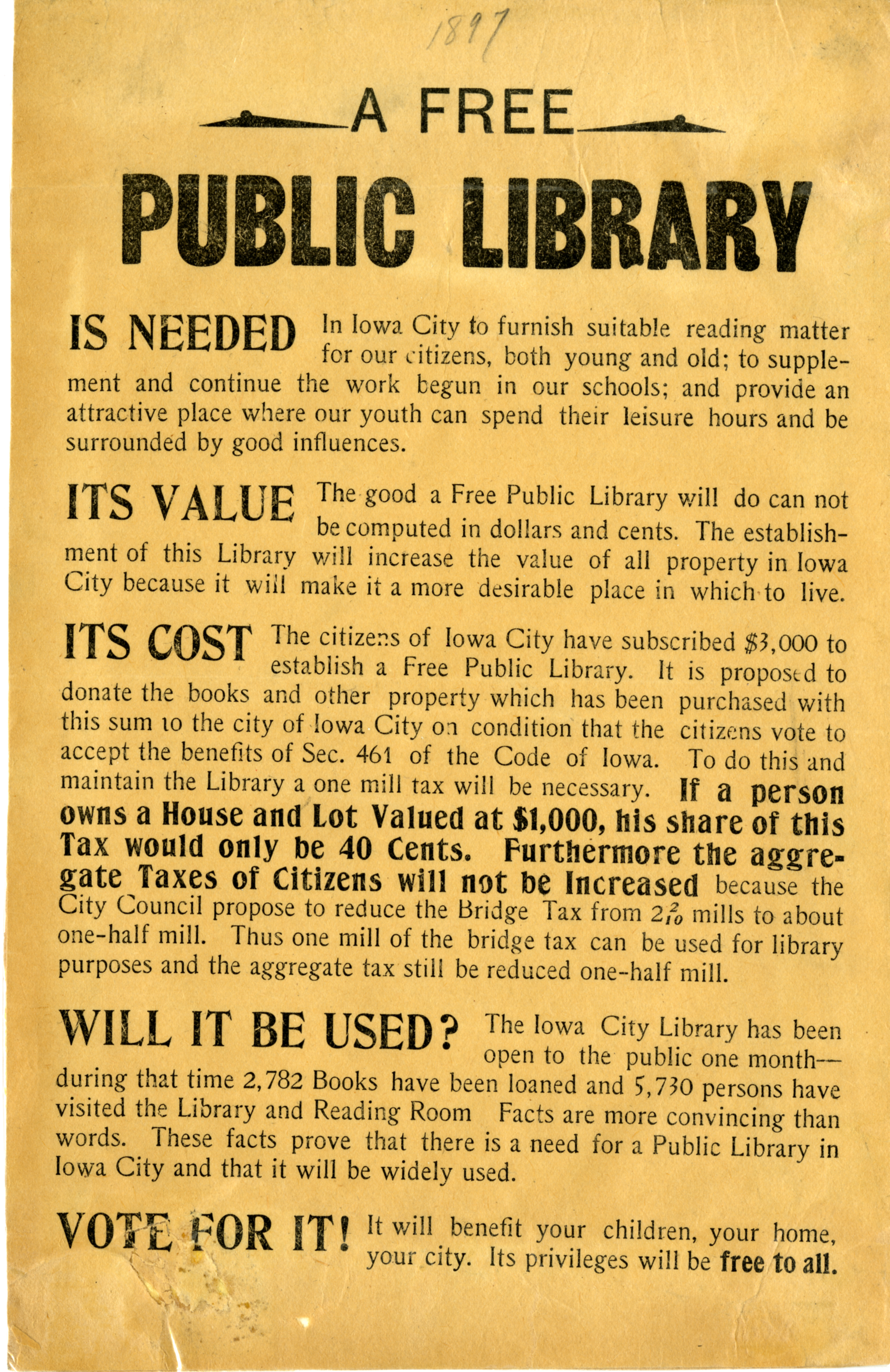
When the Library first opened its doors, it resided on the second floor of the building that housed C.O.D. Steam Laundry at 211-213 Iowa Ave. The Library Board had secured a one-year lease on the 30x100 foot room for a total cost of $375. Within three years, the Library had outgrown their current location, and was in search of a location that would be more sustainable for the long run. In 1900, the Board signed a new lease for a space at 212 College St, which was around 1,000 square feet bigger than the previous location.
The Library Board realized that for the Library to provide excellent services to Iowa City’s community, it would need a permanent building. Only a couple of months after the opening of the second Library location, the Library Board sent an inquiry to Andrew Carnegie, to see if he would be amenable to providing money to facilitate the building of a permanent Library here in Iowa City.
Andrew Carnegie was born in Scotland and immigrated to the United States at the age of 13. He spent his early life working various jobs and was very pleased to have been granted access to a private library by Colonel James Anderson, where he furthered his education. He began creating his fortune through the stock market and private investments and created several large businesses – the most prominent being the Carnegie Steel Company. In 1901, the sale of his steel company rocketed Andrew Carnegie from being wealthy into being one of the wealthiest men in the world.
Carnegie began donating large portions of his wealth beginning in 1870 and continued doing so until his death. Remembering how access to a library helped his education as a youth, he often took an educational route with his philanthropy. In total, Carnegie funded 1,679 libraries in the United States – and about 1,000 more abroad.
As Carnegie was in the business of giving out philanthropic donations to cities all over the United States, he had early-on set up an application process for those wishing to receive a donation. Library Boards or City Councils would apply to Carnegie, stating the reasons a library building was needed in their town. James Bertram, Carnegie’s personal secretary and the person who handled most of the Library donation matters, would write back with questions. These questions would be about the town, the population, the financial situation of the town and the current library, among other topics. If the answers were suitable to Carnegie, a donation offer would be made.
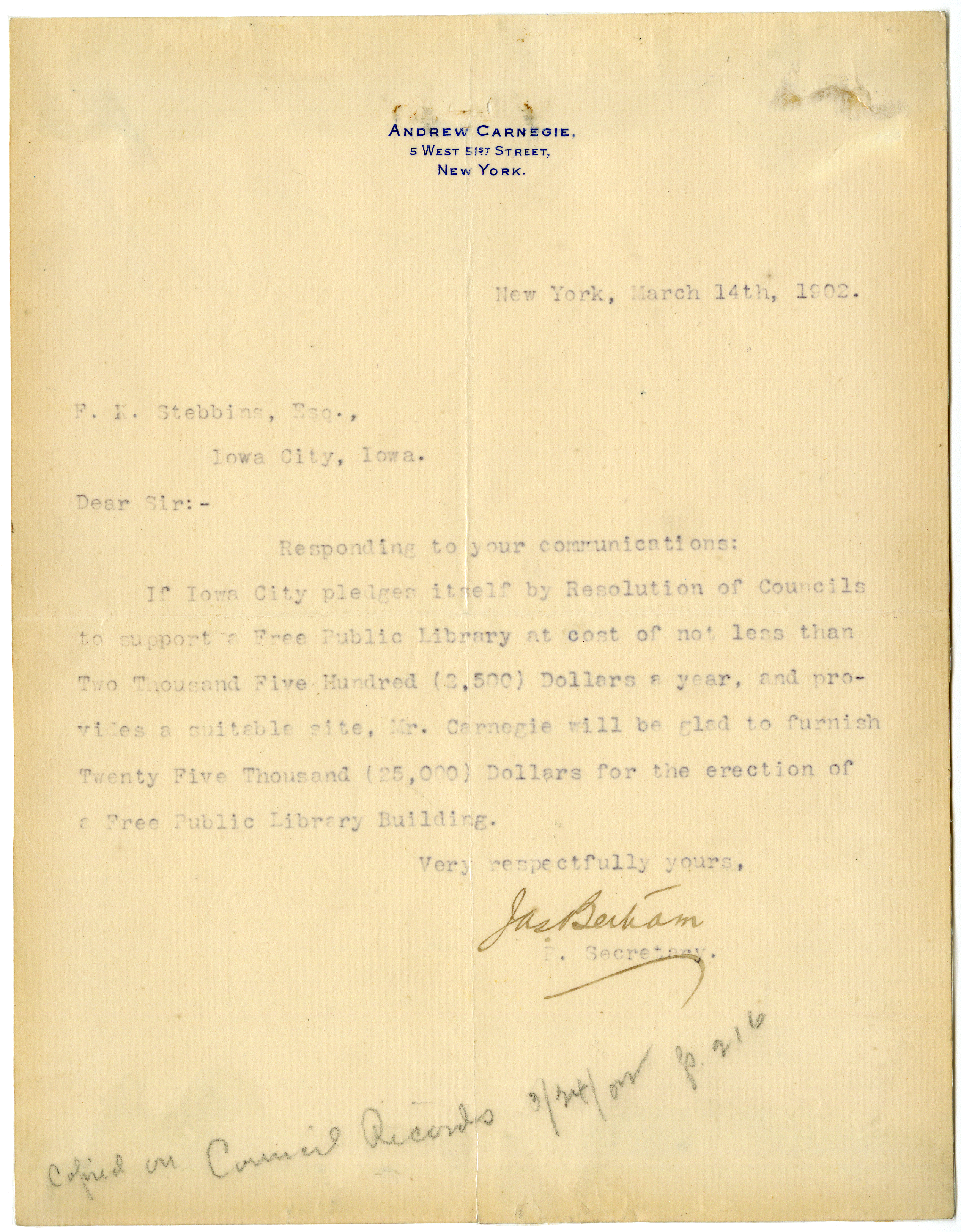
The Library Board and the Iowa City Council were grateful for Carnegie’s offer and voted to accept it. Although it wasn’t common for cities to turn down an offer from Carnegie after soliciting one, it also wasn’t unheard of. Carnegie required that cities be able to support the library through a municipal library tax, generally set at 10% of the amount he was giving towards the library. Some cities couldn’t pass the tax required through local vote and so had to turn down the offer. Iowa City’s library tax, however, already brought in more than what Carnegie would have required for his donation.
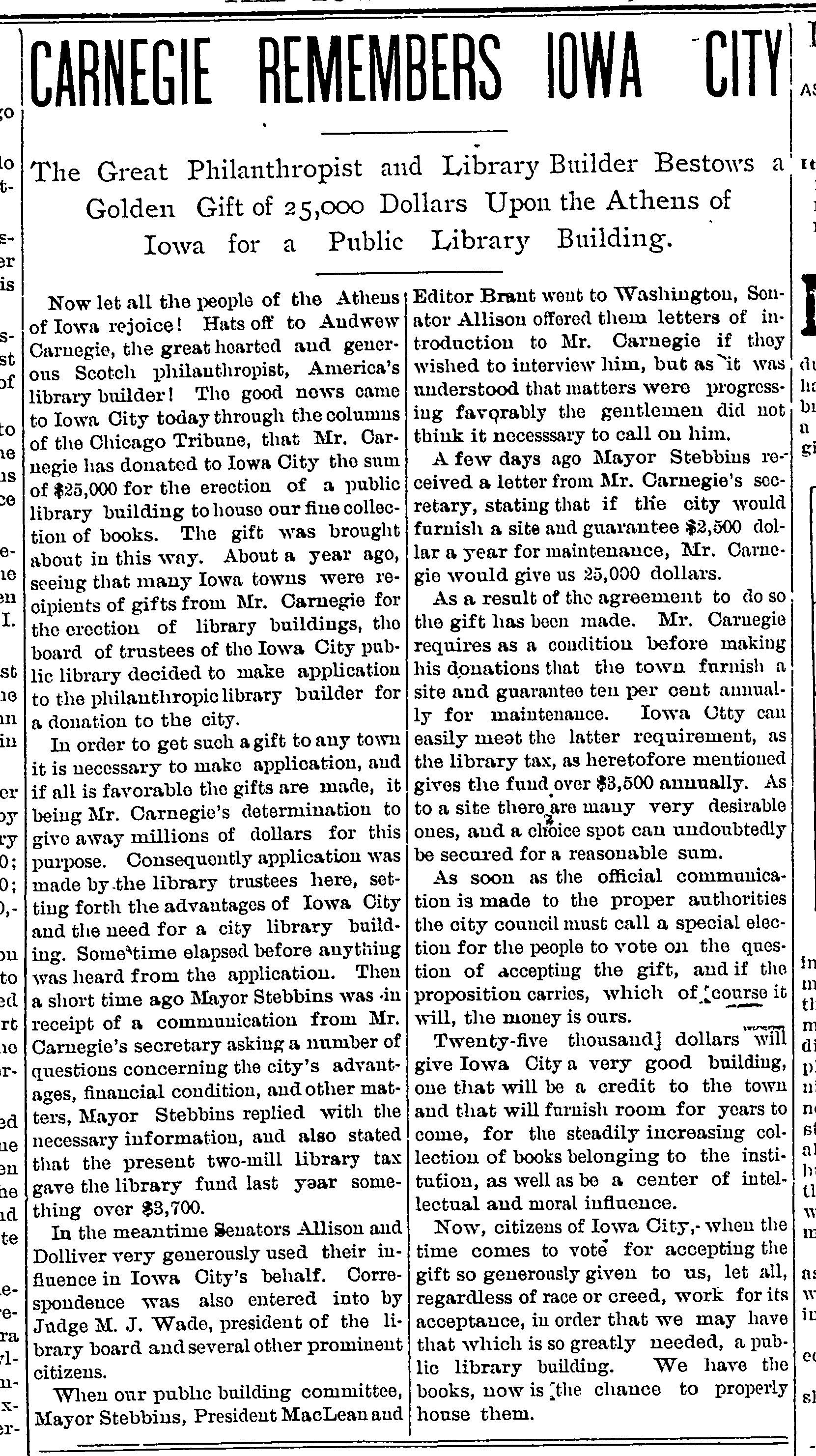
Carnegie also required that cities own and select a plot of land on which to build the new library before he would release any of the donation to them. The City of Iowa City gifted land to the Library Board on which to build the new library, located at 212 S Linn St.
It became clear fairly early on that it would cost more than $25,000 to build a Public Library of the size that Iowa City needed. With high circulation numbers, and both a growing collection and population, the current offer wouldn’t be enough to finish the building, let alone furnish it. The Library Board wrote to James Bertram and asked if Carnegie would be willing to increase his gift to $35,000. Bertram replied that it was not currently an option.
Convinced that $25,000 wouldn’t be enough, the Library Board asked Senator Alison if he would be willing to talk to Carnegie to attempt to explain to him why the Library Board felt they needed the increased gift offer. As luck would have it, Senator Alison was successful! Bertram wrote back that Carnegie would increase the grant money to $35,000 if the town would commit to supporting the Library with a tax that brings in at least $3,500 a year rather than the previous $2,500. This was very agreeable to the people of Iowa City.
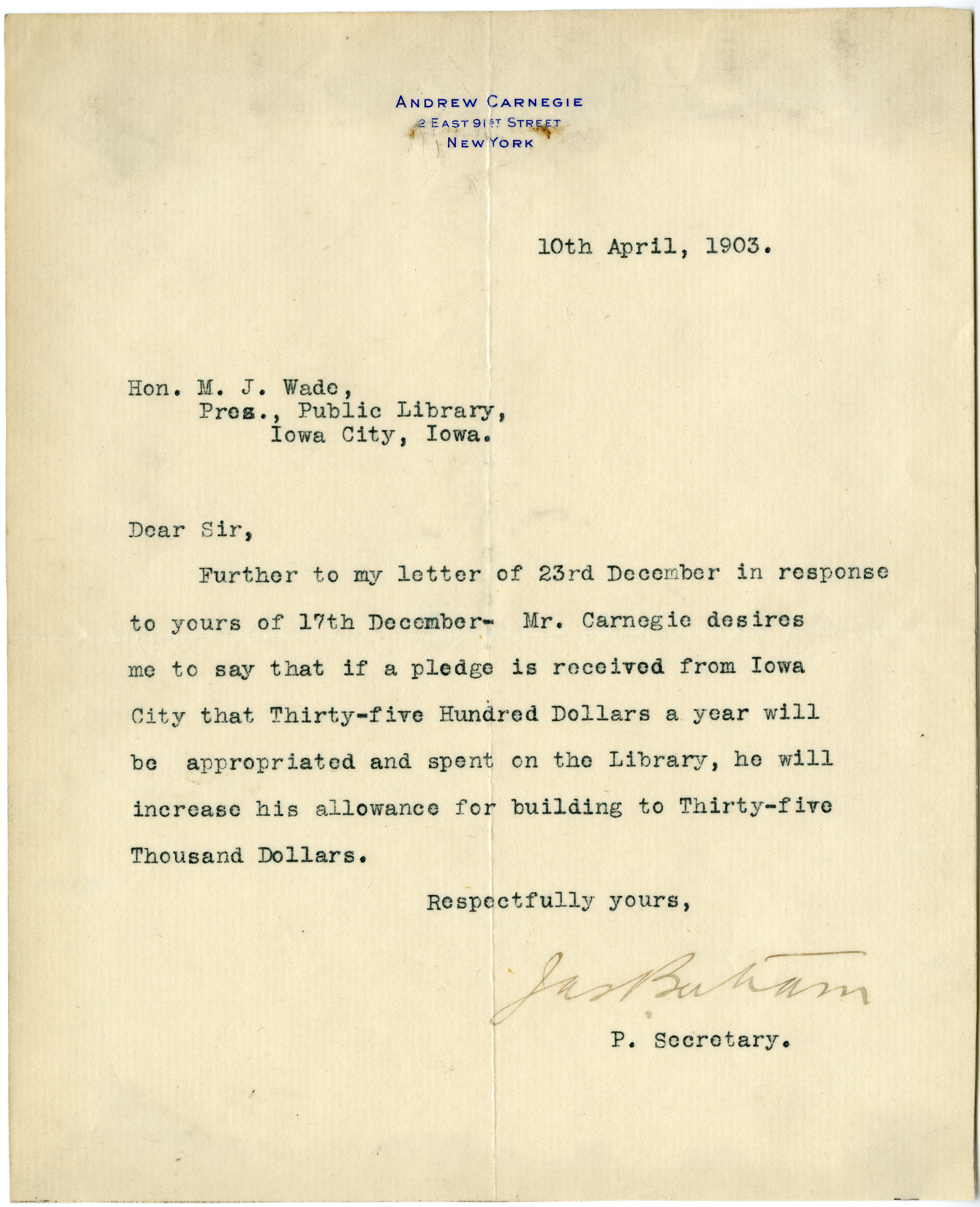
The Library Board contracted with a local construction company, Sheets & Freyder, and architects Liebbe, Nourse & Rasmussen from Des Moines. The total cost to build the new Library was $35,729.51, including furnishings. The City of Iowa City supplemented Carnegie’s donation with the profits of the sale of the buildings that were previously on the Library’s land. Construction began in 1903 and finished in 1904, with minor hiccups including having to send stone out to be cut rather than being able to do it locally.
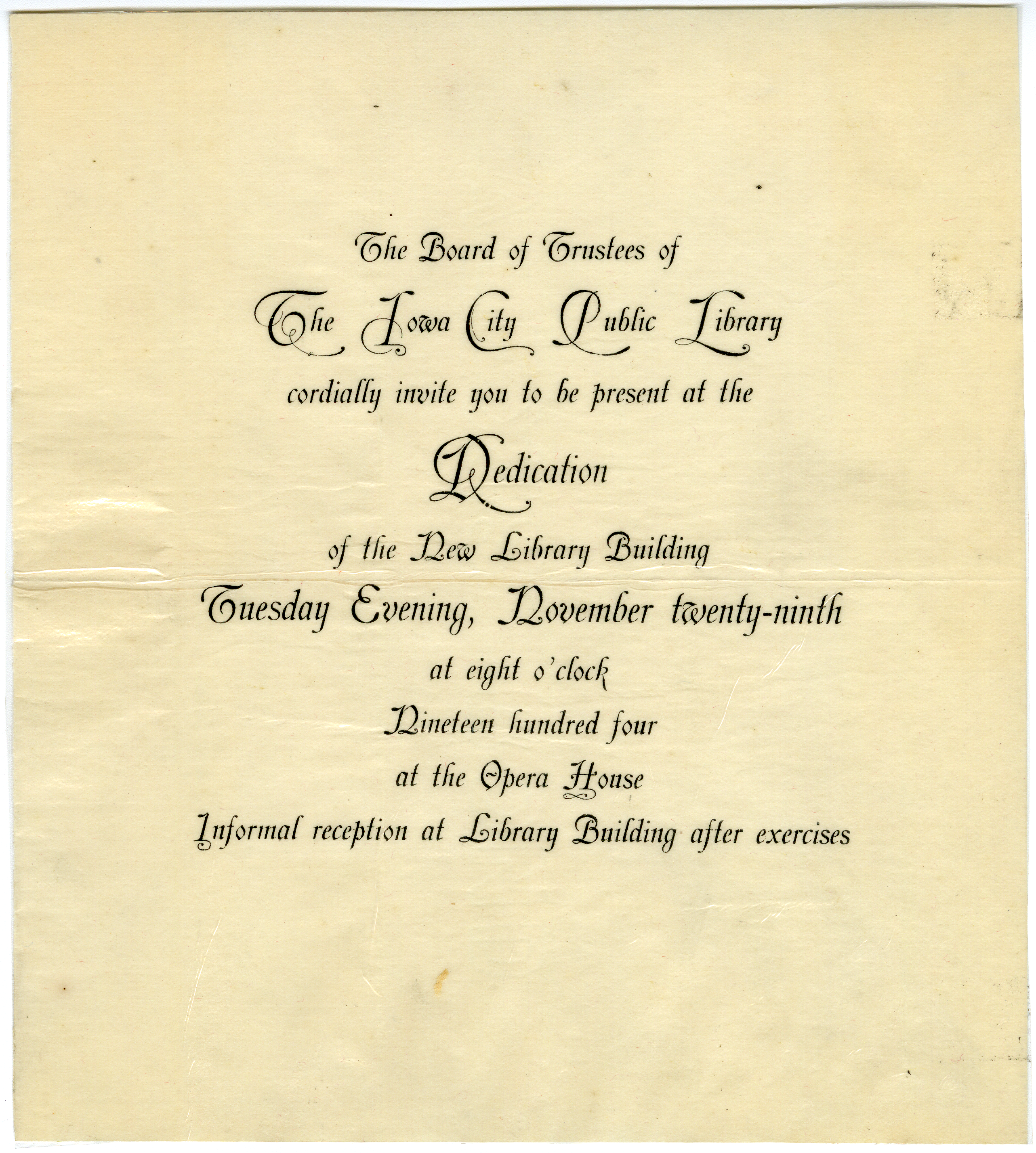
The building was completed in 1904 and opened its doors to the public in November. The dedication involved addresses from President of the University of Iowa G.E. MacLean, Judge M.J. Wade, Mayor F.K. Stebbins, and others at the opera house followed by activities at the Library. Iowa City was very pleased with the new building, as you can tell from the following newspaper article about the dedication.
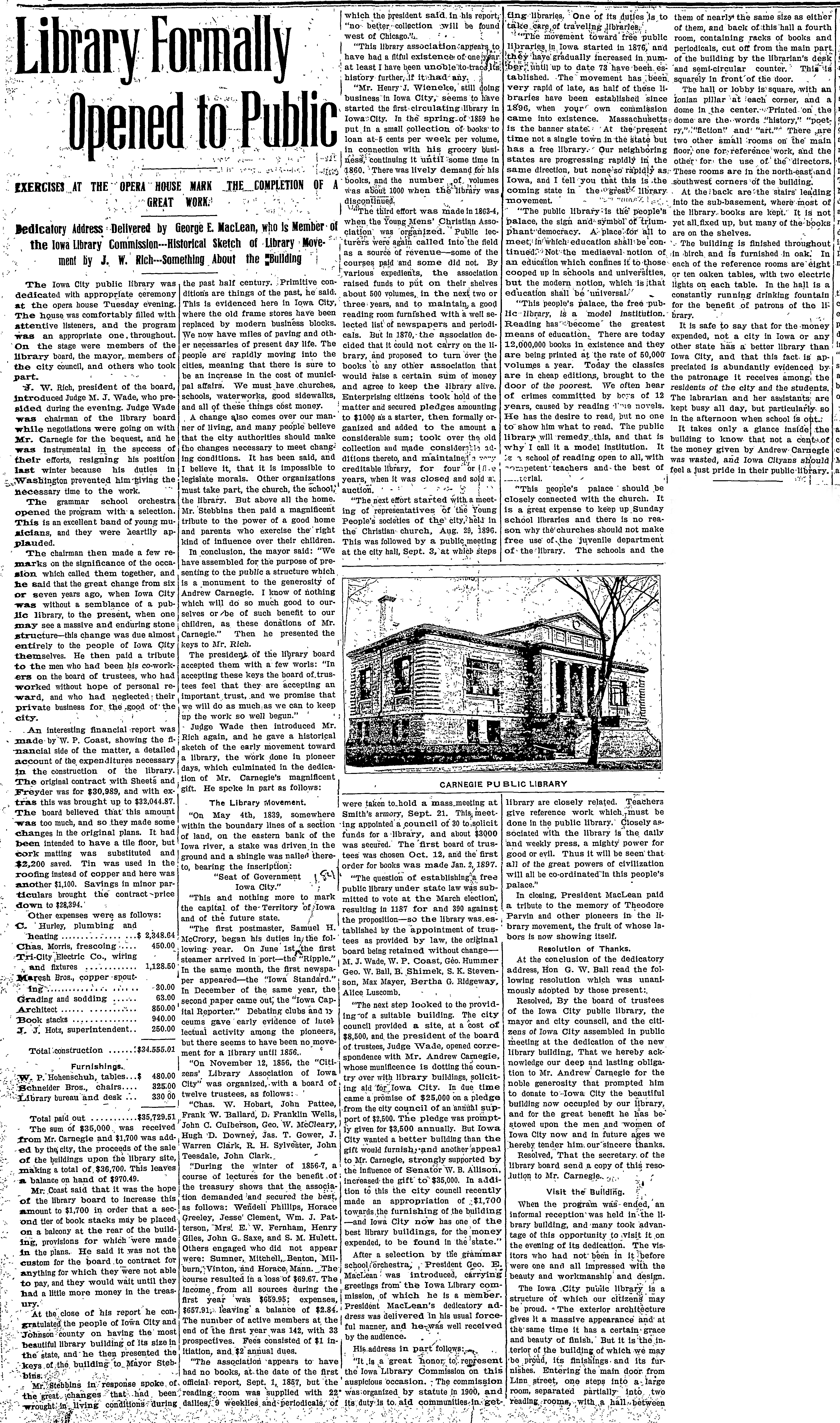
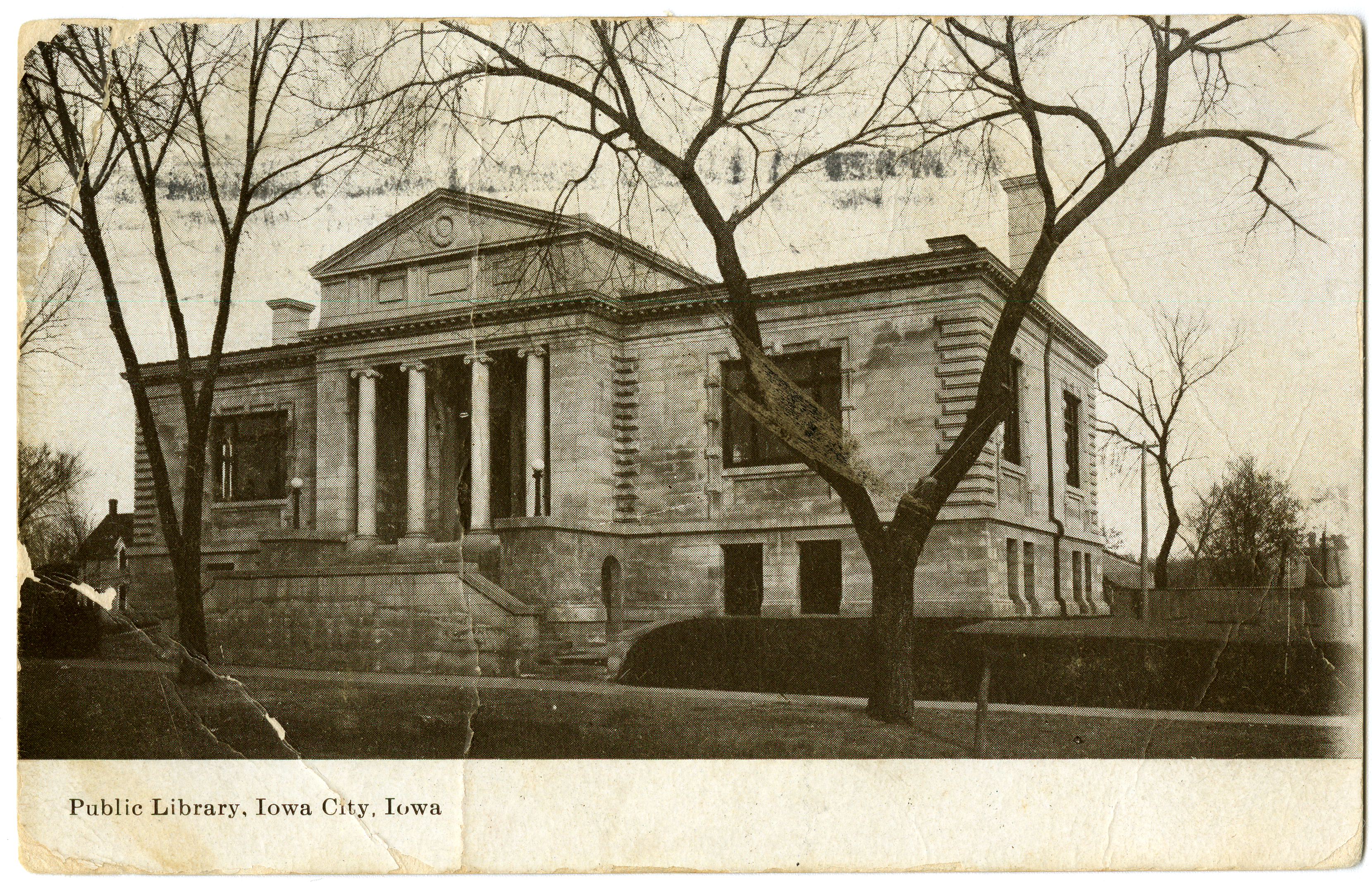
The Carnegie Library was used as the Iowa City Public Library building until 1981. It went through major renovations in the 1960s to make the building more accessible and to add desperately needed square footage – the books were quite literally stacked to the ceilings in some areas!
The renovation bought us some time, but in the late 1970s, it was clear that the community had simply outgrown the building. Although the library moved to our current location in 1981, the Carnegie building still stands just across the street.
Iowa Carnegie Libraries Fun Facts:
The first Library funded by Carnegie that he had no personal ties to was in Fairfield, Iowa in 1892.
In total, 104 towns in Iowa applied to Carnegie for grant money, but only 99 towns ended up being able to accept the money. Those 99 towns built 101 public libraries.
Of the 101 public libraries built, only 8 have been torn down – although, like Iowa City, about half of the buildings remaining are no longer used as libraries.
Sources and Further Readings:
1890s - 1920s Scrapbooks. Iowa City Public Library Archives. Iowa City, IA.
"Carnegie Remembers Iowa City" (1902, Mar 26) Iowa City Republican. Retrieved from Historical Iowa City Newspapers via the Iowa City Public Library.
"Library Formally Opened to Public" (1904, Nov 30) Iowa City Republican. Retrieved from Historical Iowa City Newspapers via the Iowa City Public Library.
Eggers, Lolly. (1997) A Century of Stories. Iowa City Public Library Friends Foundation.
Witt, John M. (2003). The Carnegie Libraries of Iowa. Robidoux Books.
Carnegie Libraries in Iowa Project Digital Archive
Carnegie, Andrew. (2012) Autobiography of Andrew Carnegie. Duke Classics.
Nasaw, David. (2006). Andrew Carnegie. Penguin Press.
Carnegie Corporation of New York: Interactive Story of Andrew Carnegie
